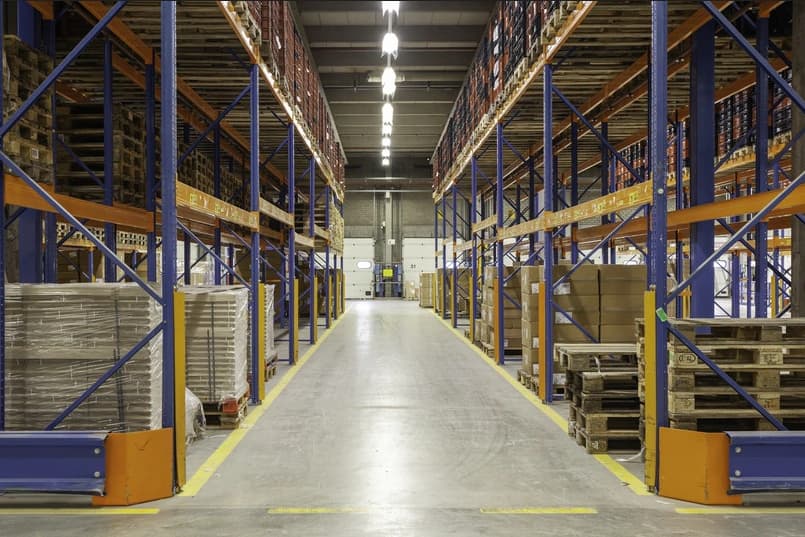How Warehousing Management Systems Boost Efficiency in Logistics

The optimization of warehouse operation management is an essential research problem currently due to the high-speed logistics information that requires companies to maintain competitiveness. Implementing high-featured facilities management systems (WMS) is one of the most critical methods for enhancing the efficiency and accuracy of supply chain operations.
The WMS market worldwide was worth US$3.94 billion in 2023. From 2024 through 2030, WMS implementations across different sectors will grow at a 19.5% compound annual growth rate (CAGR).
Modern warehouse management system applications let organizations track inventory in real-time. These systems also have automatic order processing features that optimize storage allocation, boosting warehousing supply chain management effectiveness.
Implementing new-generation warehousing management solutions enables corporations to manage their logistics efficiently, lower operational expenses, and deliver better customer value through adaptable approaches.
How Warehousing Management Systems Transform Storage Efficiency
Optimized Space Utilization
The Warehouse Management System (WMS) performs optimally by deploying smart slotting solutions. WMS systems select optimal storage positions & evaluate product shape, weight, and operational demand levels. Thus it decreases space-blocking issues also make storage more accessible and reduce unused areas.
Automated Inventory Tracking
Traditional inventory tracking methods are prone to human errors. WM systems deliver real-time intelligence about inventory to businesses using radio-frequency ID (RFID), barcode scanning, and Internet of Things (IoT) service. This means that it can guarantee correct stock levels, can prevent items from being lost, and cannot overstock or be out of stock.
Container loading calculator tools integrated within WMS help businesses to maximise available space by efficiently distributing goods in warehouses and shipping containers. Thus it ensures better storage utilization and reduced shipping costs.
Enhanced Picking and Packing Efficiency
The WMS system regulates order fulfillment by steering warehouse workers to optimal picking routes. Automated systems (e.g., robotics and conveyor belts) further speed up the process by eliminating manual labor and improving order accuracy.
Improved Coordination in Warehousing Supply Chain Management
Seamless integration of logistics warehousing management with suppliers and distributors permits the continuous running of inbound and outbound processes. The system produces faster lead times and shorter turnaround times while improving customer satisfaction.
High-tech warehousing management systems allow businesses to optimize storage capacities while decreasing operational expenses and boosting execution effectiveness.
The Role of a WMS System in Logistics Performance Improvement
A Warehouse Management System (WMS) represents a significant breakthrough that enables improved management of all warehousing operations. The system allows for operational automation, minimizes human error, and enhances logistics operations.
Less than container load calculator tools integrated into WMS help businesses optimize partial shipments, reducing shipping costs while ensuring better space utilization for smaller cargo loads.
In warehousing supply chain management, smooth data transfer between the transportation and ERP systems enables suppliers and distribution channels to collaborate.
Exploring Advanced Warehousing Management Solutions
AI and Machine Learning Integration
WMS systems implement AI and machine learning to detect demand patterns and optimize storage layouts. Through predictive analytics, companies obtain the tools they need to establish strategic plans and forecasts that reduce inventory deficiencies while minimizing unnecessary stock levels.
IoT and Real-Time Tracking
IoT device plugging technology-which means monitoring goods in a warehouse on a real-time basis-is the integration of IoT devices. Smart sensors, RFID, and barcode readers facilitate visibility and enable precise stock management. With that, there is a more effective logistics warehousing management through loss reduction and effective order delivery.
Automation and Robotics
Implementing automated picking systems, robotic process automation, and conveyor-based sorting improves time efficiency and operational speed. Modern technological improvements decrease human mistakes and ultimately increase operational speed throughout warehousing and procurement supply chain systems.
CBM freight calculator tools integrated into WMS allow businesses to measure cargo volume and weight accurately, enabling precise freight cost estimation and better logistics planning.
Key Features of Modern Warehousing Management Systems
1. Real-Time Inventory Tracking
The WMS system enables users to monitor inventory levels instantly through three key components: RFID technology, barcode scanning, and IoT sensors. The system allows manufacturers to manage their stock precisely, minimizing losses from improperly placed items and running out of inventory.
2. Automated Order Processing
When implemented for order picking, packing, and shipping operations, warehousing management solutions promote error-free operations while improving delivery speed. Using AI algorithms generates optimal picking routes, improving operational efficiency.
3. Smart Storage Allocation
Warehouse organizations implement AI-based slotting systems that organize inventory through product dimension analysis and demand frequency measurements. This method optimizes warehouse space utilization while decreasing the time required for product selection.
4. Seamless Integration with Logistics
The workflow between warehouses, suppliers, and delivery networks becomes seamless because advanced warehousing management systems use direct connections to ERP systems and transportation and e-commerce interfaces.
5. Predictive Analytics and Reporting
Businesses enhance logistics warehousing management by analyzing data to anticipate market patterns and determine inventory volumes and workforce distribution.
Improving Operational Efficiency with Warehousing Operations Management
Maintaining efficient warehousing operations is a fundamental requirement for businesses wishing to enhance their logistics systems alongside their supply chain performance.
Global FCL service solutions integrated into advanced WMS platforms manages full container loads, coordination of freight, inventory tracking .
- Streamlined Inventory Management: A WMS system provides real-time inventory control through barcode scanning, RFID, and IoT integration. The system eliminates human mistakes and counts products correctly to maintain accurate inventory records.
- Optimized Workforce Productivity: Warehousing management systems increase labor efficiency using automated task assignments and AI-driven workflow optimization to optimize workforce productivity. Workforce efficiency improves through optimized task routes that shorten travel time and boost order completion success.
- Faster Order Processing: Implementing advanced warehousing supply chain management enables rapid, accurate order processing. Organizations can minimize delivery mistakes and boost shipment speeds through automated sorting operations, packaging solutions, and shipping equipment.
Reduced Operational Costs: Implementing automation for logistics warehousing management eliminates manual work costs while reducing human errors and decreasing storage expenses. Predictive analytics helps manage inventory replenishment by reducing the risk of overstocking while achieving better inventory control.
Shipment consolidation strategies as supported by WMS technology combine multiple small shipments into a single, cost effective load to reduce logistics expenses.
How a Customized Inventory Management System Can Improve Warehouse Efficiency
To enhance the efficiency of warehouse operations, businesses requires inventory management solutions.
By adopting a customized inventory management system, businesses streamline order processing, enhance inventory visibility, and reduce operational costs.
Read more about customized inventory management here.

The Importance of Effective Warehousing Supply Chain Management
Smooth logistics operations depend heavily on effective warehouse supply chain management. Installing advanced warehousing management systems lets businesses enhance their order precision while lowering operational expenses and boosting efficiency. Integrating predictive analytic tools into warehousing management alongside automation systems prevents inventory overstock and stock depletion issues.
Future Trends in Logistics and Warehousing Management
Logistics warehousing management faces significant transformation from new innovative technologies that create better operational performance and safety measures while supporting sustainable initiatives.
The revolutionary trend involves AI-driven warehouse automation enhances inventory management, order fulfillment and minimises human errors.
Blockchain technology creates secure, transparent transactions that support inventory tracking and supply chain management primarily through real-time updates to enhance stakeholder trust. Sustainable warehousing solutions are emerging stronger because companies adopt environmental practices like efficient systems and solar-powered warehouses and waste reduction strategies to reduce their carbon emissions. The emerging trends combine to transform logistics by establishing technologically sophisticated and more sustainable warehousing methods for future needs.
Conclusion
Warehousing management systems help businesses to reach their maximum logistics potential. A WMS helps businesses by improving inventory accuracy and increasing supply chain effectiveness.
Through warehousing management solutions, companies achieve competitive advantages, reduce operational costs, and improve customer satisfaction. Warehouse operations that utilize modern technologies allow for smooth logistical processes and progressive business expansion.
You need specialized guidance to manage your logistics warehousing operations. Contact CargoesPi to learn how modern warehousing management solutions can transform your business operations. Contact us now.
FAQs
What is a warehousing management system (WMS)?
The WMS software manages warehouse optimization through inventory tracking, order processing, and supply chain coordination functions.
How does a WMS improve logistics performance?
Implementing a WMS system creates efficiency by providing task automation with better accuracy and lower human error rates.
Can a WMS integrate with existing business systems?
WMS platforms offer smooth integration with ERP and CRM systems and transportation management solutions.
What are the key benefits of using a WMS system?
Real-time inventory tracking comes together with improved order accuracy, faster delivery times, operational cost reductions, and real-time inventory tracking.

